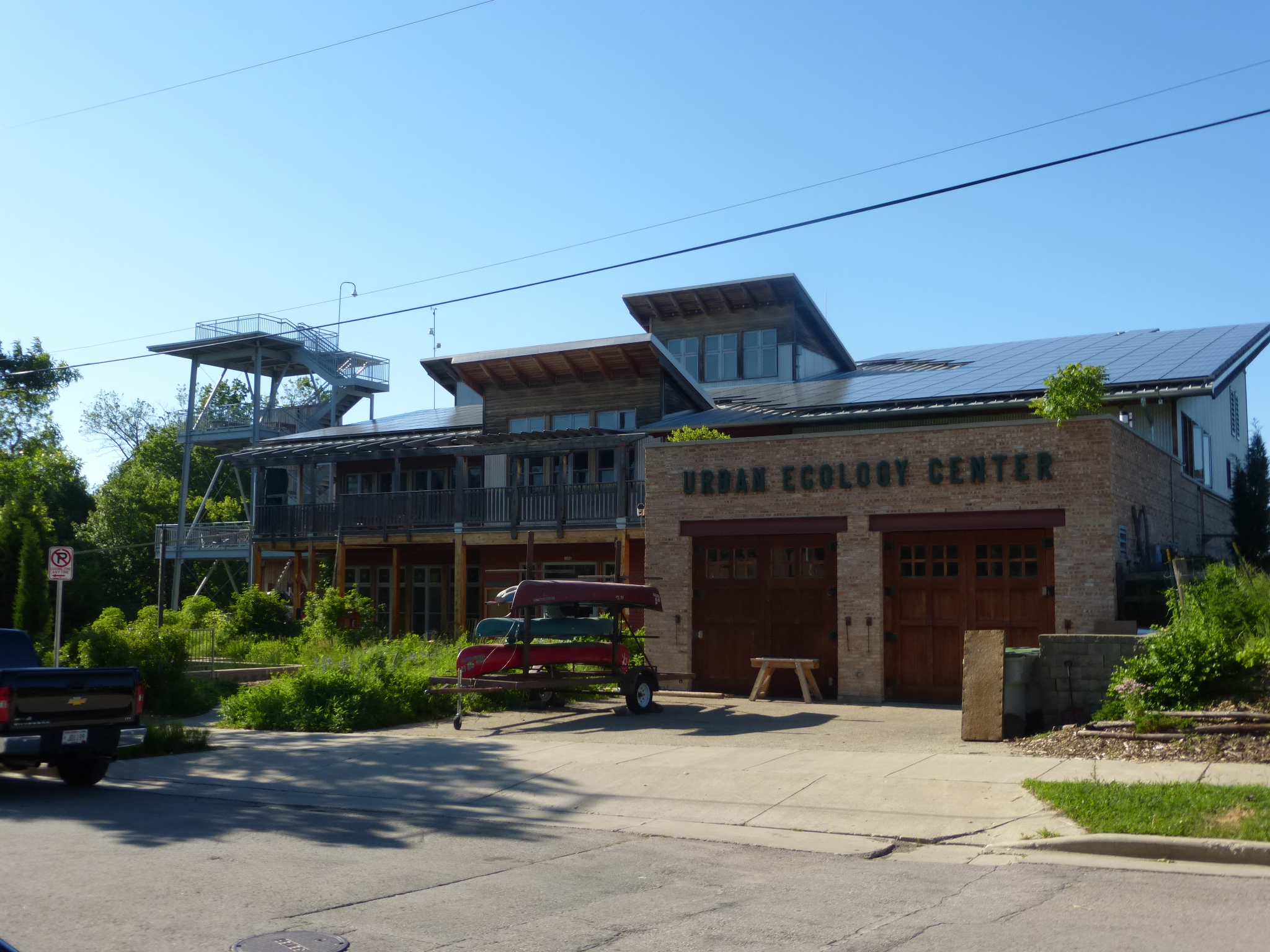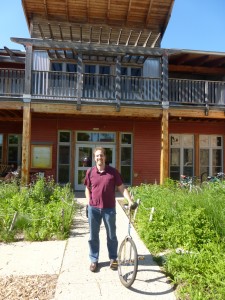On the Evolution of “Community Ecology Centers”
Posted by Martin Ogle on Jul 30, 2013 in All Posts | 2 comments
Come take a tour with me. See that family enthralled with a snapping turtle? The ancient reptile fans its webbed feet and meets the kids nose to nose at the aquarium glass. Check out this exhibit on local real estate and community events. While we’re standing there, a delighted child whooshes down a slide past a mural of a local stream. Over on the bookshelf, titles on local human and natural history are interspersed with novels, classics, games and puzzles. Take notice of the people coming and going – business executives, teenagers, families from across the socio-economic spectrum, and groups from all over the city are constantly in and out. People are working, relaxing, recreating, sharing ideas, and creating, sitting at computers, climbing a rock wall, reading, meeting, studying the landscape atop a viewing tower, eating . . . you name it. We inquire about projects that people are involved in and learn of summer camps, the “green career pipeline,” city planning and dozens of others. At the info desk, we see members coming in to borrow – at no charge – bicycles, fishing rods, canoes and more. Let’s follow them outside! People are off in every direction: in gardens, on paths hooking up to trails, on trails to the river, in the river, working on land restoration and more!
 This is the nature center of my dreams . . . only, it’s not really a “nature center.” It represents an evolution towards facilities that help people understand, celebrate and build on the places they live. This is the Urban Ecology Center in Milwaukee, Wisconsin.
This is the nature center of my dreams . . . only, it’s not really a “nature center.” It represents an evolution towards facilities that help people understand, celebrate and build on the places they live. This is the Urban Ecology Center in Milwaukee, Wisconsin.
Early in my career as Chief Naturalist for the Northern Virginia Regional Park Authority, I came to understand that I didn’t really believe in nature centers! It’s not that I didn’t (or don’t) believe in what nature centers do. It’s important to educate people about birds and trees, rocks and soil and the like. It’s just that by so distinctly separating out those kinds of “natural” things from everything else in our lives nature centers have contributed, subliminally but powerfully, to the notion that humans and our affairs are somehow separate from nature. Not only that, nature centers have come to be thought of as mostly for kids and families, not for youth and adults on their own. If we are to truly honor and exemplify the basic concept of ecology–that everything is interrelated–then we must make sure to integrate all aspects of our lives with the life of our place and the life of our planet!
In the late 1980s, I attended a fascinating session at a professional conference that was a discussion about the future of nature centers. During that discussion, I raised the notion that nature centers might evolve towards something that transcended and improved upon their 1960s and 1970s origins. I opined that nature centers could become “next-generation community centers” that would help strengthen communities and bind their members together by facilitating a common exploration and exaltation of place. Looking back on it, I realized I should have introduced this idea with more preamble and justification, for my suggestion was greeted with stony silence. The basic character of nature centers was apparently firmly entrenched and not negotiable – at least at the time.
But the question lingered and grew in my mind in the ensuing years – “Can nature centers lose their identity as such and yet be more true to the ecological underpinnings that gave rise to them?” I felt compelled to actively explore this question at my place of work, Potomac Overlook Regional Park and Nature Center in Arlington, VA.
The staff at Potomac Overlook had used the phrase “everything is interrelated” as our guiding principle starting in the late 1980s and created activities and features in keeping with this theme. Recognizing that energy is the most significant nexus between human systems and the rest of nature, we began by making energy improvements and adding solar hot water to the park buildings and instituting energy education programs. We added a demonstration organic vegetable garden, expanded the interpretation of local human history and blended it with local natural history. We created community events such as a concert series and a public fair. We used Gaia Theory (the scientific idea of Earth as a living system) to further guide and explore our underlying theme of “everything is interrelated” and created a mission statement to reflect this. In the end, we partnered with dozens of community groups, schools and organizations on issues including energy, agriculture, youth education, music and art, sustainability, economy, careers and others.
Our staff was proud of how we directed the evolution of Potomac Overlook Nature Center. But, as of the time I retired, we still had not come close to creating anything as powerful as the Urban Ecology Center in Milwaukee. In some ways, this can be chalked up to different settings, sponsoring organizations (a government organization vs. a private non-profit), accessibility, etc. But the opportunities for Potomac Overlook – or any other nature center – to emulate and add to what has been done at the Urban Ecology Center abound.
In recent years, many communities have been talking about sustainability, energy and agriculture, the need for people (especially children) to spend more time outdoors and other things that affect their health and success. Unfortunately, in a time of strapped budgets, nature centers are often under scrutiny for cuts or for uses aimed more towards the goal of increasing revenue with no direct link to sustainability. This is sad and ironic, for almost every existing nature center in the country has the potential to contribute even more significantly than they are already to progressive action. Nature centers have huge potential for being creators and catalysts for sustainability in their communities through employing, fully and practically, the tenets of ecology upon which they were founded. Let’s not eliminate or reduce the role of nature centers, lets expand them to realize their full potential as education and demonstration centers for sustainable energy and agriculture, as meeting places for a wide cross section of our communities, as places where intergenerational wisdom and love is shared . . . and so much more! But let’s also contemplate a change in nomenclature as well.
As a great example of movement in this direction, I commend the Urban Ecology Center to the attention of municipalities, park systems and non-profits . (See http://urbanecologycenter.org/. Let’s envision and create the next generation of nature centers – community ecology centers – everywhere!








Martin, the three words used to label educational facilities have powerful meaning when combined as a concept:
1. Community — across the nation, communities have land assets set aside as parks and conservation areas, where communities are both rural, suburban, and urban. By thinking about “ecology” in the context of a community and as a community of focused attention, is beneficial.
A park can be just woods and trails, or it can be host to sharing ideas about nature, conservation, ecology, and sustainable living.
As you did in Arlington County, Virginia at Potomac Overlook, the park became a theme for instructing the community about Gaia Theory. Children received instruction, visitors received the messages along the pathways, and gardeners put it into hands-on practice. It was a splendid example of impassioned community of learning.
2. Ecology — this term is scientific and describes our living systems as a branch of biology. As you know from Gaia Theory, there are other models that account for our living systems comprehensively.
I advocate sustainable economics as a discipline and context because it applies to individuals and aggregates to communities, states, nations, and the world. It begins with how we fuel our lives beginning with renewable energy.
While America tries to achieve energy independence to lessen the world’s tensions and to ensure our own economic viability, some say we need to exploit domestic fossil fuels, while others prefer the immediate and direct advance to the only non polluting source, and that is the sun.
Clean air and clean water have already escaped our grasp throughout the nation. We have dug ourselves a hole and must clean up our mistakes while limiting and preventing any more damage.
3. Center — Having a place of focus and a source of thought leadership about these ideas is a community asset, that can become a mechanism for guiding the way ahead to a sustainable future.
I like this idea of community ecology centers as opposed to “nature centers” which might give the idea that we are not actually a part of nature ourselves. (Though your nature center at Potomac Overlook Regional Park was a pretty cool place!)
I was just talking to my friend Allison yesterday about how we seem bent on self-destruction sometimes as a society. We treat our own bodies badly and treat our collective body (the earth) badly as well.
It’s all connected.. so maybe these community ecology centers can help us feel a part of the whole and help us contribute to our own health.
Thanks for encouraging us to think about these things.